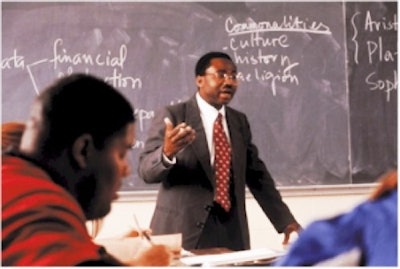 The quality of teacher education programs is deficient according to a new report.
The quality of teacher education programs is deficient according to a new report.WASHINGTON—Teacher preparation programs in the United States have largely become an “industry of mediocrity” that routinely produces first-year teachers who are ill prepared to teach the nation’s increasingly diverse student population.
This is one of the key contentions in a scathing new report that the National Council on Teacher Quality released Tuesday in conjunction with its long-awaited and controversial rankings known as the Teacher Prep Review.
The rankings—a portion of which were published in U.S. News & World Report—spotlight an area of education that has largely evaded public scrutiny, according to Kate Walsh, president of NCTQ.
“The results were dismal,” Walsh said Tuesday during a conference call about the Teacher Prep Review.
“I’d like to remind folks that this is not NCTQ reaching this conclusion that others haven’t arrived at many times before,” said Walsh. “What is different here is we are the first to quantify the depth of this problem.”
Among other things, the report says the vast majority of programs are unselective and that a similarly large amount—93 percent—“fail to ensure a high quality student teaching experience where candidates are assigned only to highly skilled teachers and must receive frequent concrete feedback.”
The report also says too few programs prepare candidates to effectively teach the Common Core State Standards, which are set to be implemented in many states.
Other key findings include:
• 71 percent of programs are “not providing elementary teacher candidates with practical, research-based training in reading instruction methods that could reduce the current rate of reading failure (30 percent) to less than 10 percent of the student population.”
• Less than one in five programs “emulate the practices of higher performing nations such as Singapore or South Korea” in the mathematics training of elementary candidates.
• About one in 10 elementary programs, and a little less than half of secondary programs, provide “adequate content preparation for teachers in the subjects they will teach.”
Though NCTQ hailed the rankings as an “unprecedented” review of more than 1,100 teacher prep programs that will give students the consumer power to usher in much-needed reforms, leaders of schools of education criticized the review for its methodology, which relied heavily on a document review as opposed to a more in-depth program review.
Few schools scored well in the NCTQ’s four-star rating system.
“We did not find a single elementary program in the United States that earned our highest ranking of four stars,” Walsh said.
One reason that so many schools ranked poorly is because most are not selective enough, the report states. The report found that only one in four U.S. programs restrict admissions to the top-half of college students, whereas in countries that outperform U.S. students, candidates are recruited from the top third.
Some higher education leaders took exception to that finding.
Sharon Robinson, president and CEO of the American Association of Colleges of Teacher Education, cited a survey her organization did earlier this year that found that the average GPA of teaching candidates admitted to bachelor’s level teacher prep programs was 3.24, well above the average GPA entrance requirement of 2.6.
“They are selective among the students who come to that campus who are admitted to that institution,” Robinson said. “So I don’t know what [Walsh] is talking about” in terms of lack of selectivity.
Robinson said the Teacher Prep Review’s reliance upon syllabi is insufficient and its methodology “unclear.” She also questioned the motives of NCTQ and accused the organization of trying to destabilize university-based teacher prep programs in favor of alternative certification programs.
“I don’t want to be absolutely damning of this, but this feels more like a PR gimmick than a serious research study,” she said.
Robinson was not alone in her criticism of NCTQ’s review.
Raymond Lorion, Dean of the College of Education at Towson University, which, under the review, earned one-and-a-half stars in the area of program reading, also criticized the methodology of NCTQ as “unclear” and said he planned to review the findings and see if providing NCTQ with additional materials might alter the university’s score.
Lorion noted that his school of education must meet standards for numerous organizations, including the State Board of Education.
“I have to meet 17 different organizations’ requirements and all of those are antecedent to being evaluated by NCATE (the National Council for Accreditation of Teacher Education) and the State Department of Education,” Lorion said. “It takes my group literally years to prepare all the materials necessary for a comprehensive review that’s going to involve both looking at the material we submit and then a multi-day site visit.”
“I’m not suggesting that some of the NCTQ standards should not be considered,” Lorion added.
Walsh agreed that the review only scratches the surface and said more negative findings could have been unearthed if the review went deeper. She denied any deference to alternative teacher certification programs.
“Actually, there is no way alternative certification programs could meet NCTQ standards,” Walsh countered. “They would clearly fail on almost all of our measures because the content and skills we think teachers need must be provided before going into the classroom.”
“Our whole goal is to reduce learning loss for the 1.5 million students who are assigned to first-year teachers in the United States,” Walsh said, citing research in the report that shows a majority of first year teachers—who are disproportionately assigned to students in low-income schools—have a negative impact on student learning.
“Alternate routes are clearly not the solution,” Walsh said. “We do, however, want to create disruptions in the field, if, by disruption, AACTE means that we want teacher education to look a whole lot different than it does currently.”
“Our aim is to elevate high-performing programs and motivate other programs to improve,” she said.
Jamaal Abdul-Alim is a 2013-14 Spencer Education Journalism Fellow at Columbia University. His project will focus on the impact of teacher prep reform.


















